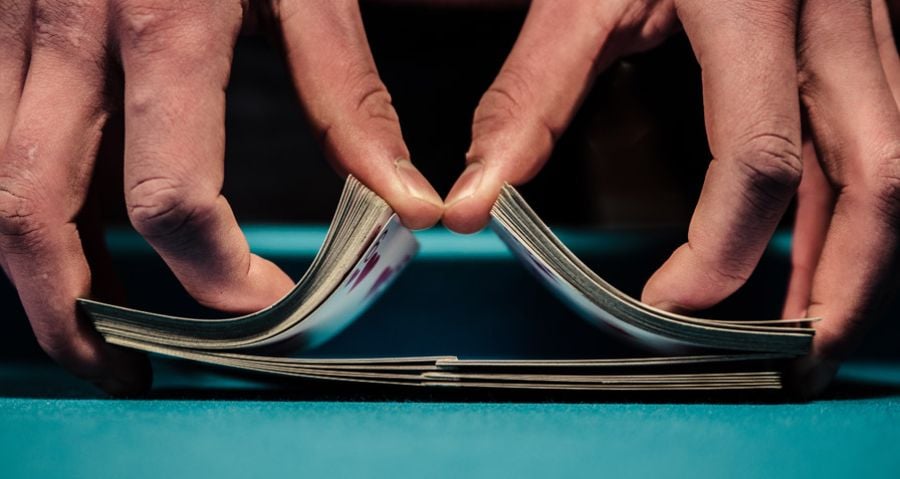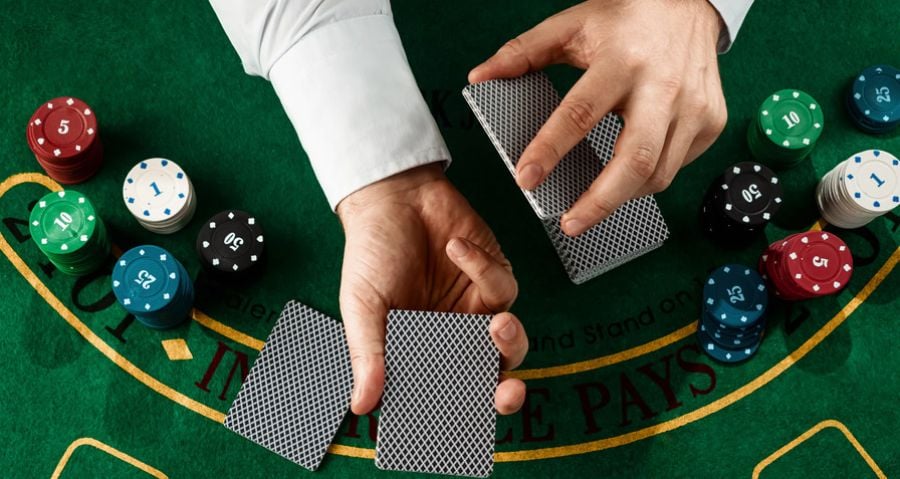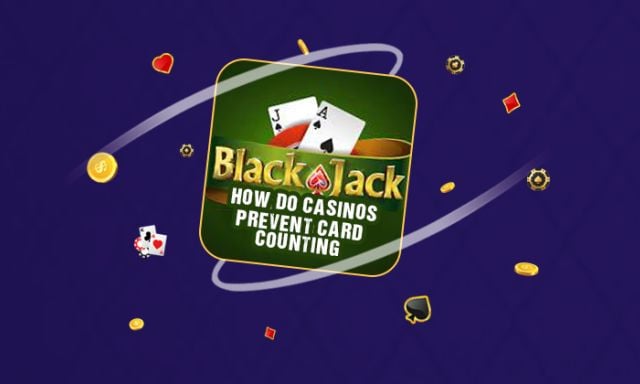How Do Casinos Prevent Card Counting in Blackjack?
How Do Casinos Prevent Card Counting in Blackjack?
Key Takeaways:
- Casinos employ measures such as frequent shuffling, multiple decks, and altering game rules to disrupt card counting.
- Surveillance systems and advanced technology are used to detect suspicious behaviour and betting patterns.
- Dealers play a crucial role in identifying potential card counters by observing betting patterns and deviations from basic strategy.
- Online casinos use reshuffling techniques and software algorithms to counter card counting.
- Casinos can take actions against suspected card counters, ranging from distracting them to banning them from the premises.
- Successful card counting can have financial impacts on casinos and affect their reputation and player confidence.
- The pressure of avoiding detection can affect a player's enjoyment and strategy.
- Cheating through devices or collusion can have legal consequences.
- The casino gaming industry is constantly evolving to ensure fair and enjoyable gameplay.
Welcome to PartyCasino's blog - your trusted guide in the captivating world of online casinos and thrilling games. Today, we're diving deep into one of the most talked-about strategies in the realm of blackjack - card counting.
Card counting, in the simplest of terms, is a technique utilized by some players in an attempt to get an edge over the house. This method, while a topic of many popular films and sensational stories, holds significant sway in the casino industry, both online and offline. It's a blend of skills and strategies that when used correctly, can potentially turn the tables in favor of the player. But does that mean casinos just stand by and let the odds tip? Far from it.
In the coming sections, we'll unravel the complex world of card counting and unveil how casinos, always one step ahead, implement strategies to prevent this practice. From sophisticated surveillance and strict legal repercussions to the role of our diligent dealers, we will cover it all. So, let's pull back the curtain on the fascinating dance between card counters and casinos. How do casinos prevent card counting in blackjack and live blackjack? Let's find out together.

Understanding Card Counting
Card counting in blackjack isn't about memorising every card that has been played. Instead, it's a strategic method where players keep track of the proportion of high to low cards left in the deck. By doing so, they're attempting to gauge the likelihood of the next hand giving them an advantage over the house. As the count becomes positive, the player's advantage grows, leading to larger bets.
This does not guarantee success but, done correctly, it shifts the game's odds slightly in favour of the player. The strategy requires concentration, quick arithmetic, and a good memory for remaining cards. The question is, who are the notable figures who have used this technique effectively?
Famous Card Counters and Their Strategies
The landscape of card counting has been shaped by several key figures over the years. Among them, Edward O. Thorp, known as the "father of card counting," stands out. Thorp used his skills in mathematics to create and prove the effectiveness of card counting. He shared his findings with the world in his game-changing book "Beat the Dealer." This book didn't just enlighten players about card counting but also forced casinos to change their strategies.
Another name that rings a bell in the card counting world is Ken Uston. Known for his mastery of team play in blackjack, Uston and his team reportedly won millions from casinos. He also played a key role in legally ensuring that skilled players could not be barred from casinos. It's these kinds of players that led to the stringent measures casinos now take against card counting.
Misconceptions About Card Counting
As with anything that gains popular attention, card counting comes with its fair share of misconceptions. The most common one is that it's about memorising every card that's been played. In reality, card counters keep a running tally in their heads. This allows them to calculate the probability of the next hand's cards, rather than knowing exactly what's left in the deck.
Another misconception is that you have to be a mathematical genius to count cards. While card counting does involve basic arithmetic, it's more about concentration and fast decision-making rather than complex calculations.
Advantages of Card Counting from a Player's Perspective
From a player's perspective, the primary advantage of card counting is gaining an edge over the casino. By knowing the likelihood of receiving a high card, players can adjust their bets accordingly, betting more when the count is favourable and less when it's not.
Although card counting doesn't guarantee success, it can certainly increase a player's chances of winning in the long run. However, mastering card counting requires practice, patience, and a fair bit of discretion to avoid the watchful eyes of casino personnel.
Myths and Facts About Card Counting
There are several myths about card counting, one of the most pervasive being that it's illegal. The truth is, card counting is perfectly legal. As long as players are using their brains and not a device, there's no law against it. However, this doesn't mean that casinos will just sit back and let card counters have a free run.
Another myth is that card counters win every hand. The reality is that even with a perfect count, the odds are just slightly in favour of the player. Card counting simply helps reduce the house's edge and give players a better chance of coming out ahead in the long run.

The Legality of Card Counting
Card counting, a strategy often surrounded by an aura of danger and excitement, finds its legality (or illegality) to be a topic of much debate. Let's get a handle on what the law says.
Legalities of Card Counting
On the surface, one might assume that card counting, a practice that gives the player an advantage, would be illegal. However, the truth is quite contrary. In many jurisdictions, card counting is perfectly legal. That's right - if you're using nothing more than your brain and a basic strategy, you're playing within the bounds of the law.
That said, while the act of card counting isn't illegal, the response from casinos can be quite significant. Casinos are businesses, after all, and like any business, they can choose not to serve customers who are hurting their bottom line. And that brings us to our next point.
Legal Repercussions for Card Counting
Even though card counting is not explicitly illegal, it's not a practice that goes unnoticed or unpunished by casinos. Card counters, once identified, can face consequences ranging from being asked to stop playing blackjack to being ousted from the casino altogether. Some casinos may even take it a step further and ban the person from returning.
Although these repercussions don't involve legal prosecution, they can be significant, particularly for those who rely on blackjack for their income. The allure of card counting, while tempting, can lead to a hefty cost - the ability to play the game itself.
The Difference in Legal Perspective Between Offline and Online Casinos
The world of online casinos introduces a new dynamic to the card counting conundrum. In traditional brick-and-mortar casinos, surveillance, pit bosses, and experienced dealers are the front line of defence against card counters. Their trained eyes and understanding of the game allow them to spot unusual betting patterns and behaviour that might indicate card counting.
In contrast, online casinos, particularly those offering virtual blackjack games, often use software that reshuffles the deck after each hand. This essentially nullifies card counting by ensuring the deck is always fresh. However, online live dealer games, where a human dealer operates from a physical deck, can present opportunities for card counting. But there's a catch - the cut card often appears midway through the deck, disrupting the count and maintaining the house edge.
How Casinos Detect Card Counting
Now that we've delved into the nuances of card counting and its legality, it's time to shine a light on how casinos detect this practice. Spoiler alert - it's not all about fancy tech and security cameras.
Role of Surveillance in Casinos
The world of casino surveillance is complex and multi-layered. The 'eye in the sky' is ever watchful, with cameras covering nearly every inch of the casino floor. These cameras, aided by an experienced team of surveillance specialists, play a crucial role in spotting unusual activities, including card counting.
Surveillance teams are trained to spot the subtle signs of card counting. They monitor for irregularities in play, betting patterns, and player behaviour. These professionals often have backgrounds in law enforcement, gaming, or security, bringing with them a set of skills that make them a formidable line of defence for the casino.
Common Techniques and Detection Strategies Used by Casinos
Casinos employ several techniques to detect card counting, all centred around the principle of monitoring for inconsistencies. Irregular betting patterns, where the player bets more when the odds favour them, are a significant red flag.
Another tool in the casino's arsenal is behaviour analysis. Casinos watch for players who seem to be thinking too hard, exhibiting excessive concentration, or those who appear to be communicating with other players in a coded way.
Software is also used, particularly in online casinos. Such software can analyse the play for statistically improbable winning streaks or betting patterns indicative of card counting.
The Role of Dealers in Identifying Potential Card Counters
Dealers are the casino's frontline defence against card counters. With their bird's eye view of the table, they're in the perfect position to identify players who may be counting cards. They keep an eye out for large bet spreads, where a player significantly increases their bet when the deck is hot.
Dealers also notice when a player is not using a basic strategy or is deviating from it in ways that seem to correlate with the deck's remaining composition. It's important to note, though, that dealers aren't there to catch card counters - their job is to run the game smoothly and ensure a good experience for all players. But if they notice something amiss, they have the authority to notify the pit boss.
The Importance of Behavioral Patterns in Detection
Observing behavioural patterns is an essential tool for detecting card counters. For instance, card counters may seem unusually focused on the game, avoid alcoholic drinks to keep their mind sharp, or display an irregular betting pattern.
Other behavioural cues may include a player who often loses track of conversation or seems uninterested in anything but the game. They may also be seen frequently checking their bankroll, or unusually, they may not seem overly excited when they win.
In essence, it's a combination of all these methods - surveillance, dealer observation, behaviour analysis, and technology - that casinos use to detect card counters. But it's not all doom and gloom for the counters. Up next, we will explore the countermeasures casinos take to prevent card counting in the first place.
Measures to Prevent Card Counting
Alright, so we've established that casinos are no fans of card counting. But what active steps do they take to prevent this practice? Here, we'll dive deep into the multi-faceted approach modern casinos use to keep their blackjack tables free of card counters.
Overview of How Casinos Prevent Card Counting
Preventing card counting is an art form in itself, requiring a mix of subtle and not-so-subtle strategies. Casinos employ a combination of techniques to maintain the house edge and deter potential card counters.
First, casinos regularly shuffle their decks to disrupt any count a player might have. Second, they use surveillance technology to monitor for suspicious behaviour, such as betting patterns that deviate from the norm. Lastly, casinos have policies in place that allow them to take action against suspected card counters, ranging from politely asking a player to leave to banning them outright.
Shuffling Techniques to Disrupt Card Counters
One of the most effective strategies to prevent card counting is to keep the decks shuffled. The "cut card" method is a common technique where a coloured card is inserted into a freshly shuffled deck. When this card appears during play, it's a signal for the dealer to shuffle the deck. This technique disrupts card counters, as they can't establish a reliable count if the deck is constantly being reshuffled.
Another method, primarily used in multi-deck games, is frequent shuffling or "shoe games." This technique can greatly reduce the effectiveness of card counting by limiting the depth of penetration (the number of cards dealt before reshuffling).
Use of Technology and Surveillance in Modern Casinos
Modern casinos are technologically advanced fortresses, leveraging state-of-the-art tech to keep the gaming fair and secure. When it comes to preventing card counting, casinos use advanced surveillance systems to monitor gameplay, focusing on players who exhibit suspicious betting patterns or behaviours.
In addition, sophisticated software programs, especially in online blackjack games, can detect unusual patterns that might indicate card counting. This is particularly effective in online casinos, as the software can analyse every hand played and bet made to identify patterns that wouldn't necessarily be noticeable to human surveillance.
Policies in Place for Suspected Card Counters
If all else fails and a casino suspects a player of card counting, they have a few tools in their arsenal. First, the dealer or pit boss might start a conversation with the suspected card counter, hoping to distract them from their count. They may also ask the player to refrain from playing blackjack, suggesting other games instead.
In more extreme cases, the casino might "back off" a suspected card counter, asking them to leave the blackjack table or the casino. In some jurisdictions, casinos can even add card counters to a blacklist, effectively banning them from the property. It's a tough world out there for card counters, but these measures are necessary to ensure fair play and keep the spirit of blackjack alive.
Countermeasures Against Card Counting in Blackjack
We've talked about how casinos prevent card counting, but now we dive deeper into the nitty-gritty of it. What specific countermeasures do they use to ensure they stay ahead of the card counters? Here we go!
The Role of Multiple Decks to Prevent Card Counting
Multiple decks, oh yes! Casinos have cleverly upped their game against card counters by using multiple decks in a game of blackjack. But why is that effective?
Well, card counting primarily works by tracking the ratio of high to low cards in a single deck. The introduction of multiple decks dilutes the impact of any one card, making the count less precise and less beneficial to the player. Thus, by simply adding more decks into the mix, casinos can significantly hamper a card counter's ability to gain an edge.
Common Countermeasures Used by Online and Offline Casinos
Both online and offline casinos have their own set of tricks to spot and counteract card counters. Brick-and-mortar casinos might employ pit bosses and dealers trained to spot the signs of card counting, coupled with surveillance systems to monitor player behaviour closely.
Online casinos, on the other hand, have the advantage of technology. Sophisticated algorithms analyse betting patterns and game history, quickly flagging any consistent deviations that might indicate card counting. Plus, online casinos often use random number generators and continuous shuffling to make card counting virtually impossible.
Effective Strategies Implemented by Casinos
Casinos employ a range of strategies to deter card counters. Regular deck shuffling is a common and effective strategy that disrupts the count. Frequent changes in dealers can also disturb a card counter's rhythm, especially if they are accustomed to a particular dealer's style.
In some cases, casinos might even change the rules of the game, such as introducing new variations of blackjack, altering the payout ratio, or modifying the betting limits. These changes can alter a card counter's established strategies and, in many cases, discourage card counting entirely.
Tips for Countering Card Counting for Casino Operators
For casino operators, prevention is always better than cure. Regular staff training to identify potential card counters is a vital first step. Spotting signs such as large bet spreads, concentration on the game, and consistent winnings can raise red flags.
Also, investing in high-quality surveillance technology and data analysis software is crucial for online casinos. Remember, card counters may think they're playing a clever game, but with these measures, we're always one step ahead, ensuring a fair and balanced gaming experience for all.
Impacts and Consequences of Card Counting
Now that we've got the measures and countermeasures covered, let's explore what happens when card counting comes into play. What are its impacts on casinos and players? And what happens when it crosses the line into cheating territory?
The impact of card counting on a casino's bottom line can be significant if not managed properly. If card counters are not detected and manage to beat the odds consistently, they could lead to substantial losses for the casino.
Furthermore, the reputation of a casino can be affected too. The news of successful card counters can encourage more to try their luck, creating an impression that the casino is an easy target. This perception can cause loyal players to lose faith in the fairness of the games, affecting not only the casino's profits but its reputation as well.
From the player's perspective, card counting is a strategy to increase their chances of winning. However, if a player is suspected of card counting, they may face serious consequences. These can range from being asked to stop playing blackjack, to being banned from the casino altogether.
Moreover, the knowledge that casinos are constantly on the lookout for card counters can significantly affect a player's game. It could lead to increased stress and potentially even affect their playing strategy, with more focus on evading detection than actually playing the game. This added pressure can make blackjack less enjoyable and more stressful for these players.
Conclusion
Throughout our discussion, we've laid out the multiple strategies casinos use to keep card counting in check. From the old school practice of using multiple decks to thwart the counters, to the advanced surveillance technologies that scrutinise every movement on the casino floor, we've seen it all.
Dealers trained to spot behavioural patterns, frequent shuffling of cards, and the use of automatic shuffling machines, are all part of a casino's robust strategy against card counting.
While card counting isn't illegal, it certainly walks a thin ethical line. Remember, casinos are private establishments and reserve the right to ban anyone they suspect of trying to tilt the odds unfairly in their favour.
Plus, there are potential legal consequences if one crosses into cheating territory, such as using devices or colluding with casino staff. It's always best to remember the saying, "the house always wins."
The digital age is changing the game—quite literally. With the rise of online casinos like ours at PartyCasino, we're entering a new era where physical tells and card counting become less of an issue. Software is less susceptible to traditional card counting strategies, which is why online blackjack games may offer a more level playing field for all players.
That said, as long as there are games to be played, there will be players trying to beat the system. It's a dynamic, ever-evolving world, and we'll continue to keep our eyes on developments and innovations that keep the gaming fair, exciting, and enjoyable. After all, isn't that what it's all about?
Frequently Asked Questions
How do casinos detect card counting?
Casinos use a combination of surveillance, dealer observations, and behavioural analysis to detect card counting. Cameras watch for signs such as consistent bet changes when the deck is in the player's favour. Dealers, trained to spot such patterns, also play a crucial role. They observe players closely for patterns, unusual play, and bet swings.
What countermeasures do casinos use to prevent card counting in blackjack?
To prevent card counting, casinos use multiple techniques. They may use multiple decks to make counting harder or shuffle the cards more frequently. Modern casinos even use automatic shuffling machines. Dealers are trained to observe players and to shuffle whenever the deck favours the player too much.
Can casinos ban players for card counting?
Yes, casinos are private establishments and can ban players they suspect of counting cards or trying to gain an unfair advantage in any other way. The ban could be temporary or permanent, depending on the casino's policy and the gravity of the offence.
Do casinos shuffle more frequently to prevent card counting?
Absolutely! Frequent shuffling is one of the easiest and most effective ways casinos prevent card counting in blackjack. By shuffling more frequently, casinos disrupt the count, making it hard for the card counters to keep track.
Are there any legal repercussions for card counting in casinos?
While card counting isn't illegal per se, it is frowned upon and considered unethical by many in the industry. If you use a device to help count cards, that is considered cheating and could have legal repercussions.
What is the role of surveillance in preventing card counting?
Surveillance plays a significant role in modern casinos. Cameras watch every table, and trained security staff observe player behaviour to spot any anomalies or patterns that could suggest card counting.
Do online casinos use different methods to prevent card counting?
Yes, online casinos have an advantage as the software used is less susceptible to card counting strategies. They use random number generators to ensure that the card dealing is entirely random, making it virtually impossible to count cards.
Are there any techniques players can use to circumvent casino measures against card counting?
While it's theoretically possible to come up with techniques to circumvent casino measures, we strongly discourage trying to cheat the system. It's unethical and could result in permanent bans or legal issues. Plus, it takes away from the enjoyment of the game.
How do dealers contribute to preventing card counting in blackjack?
Dealers are trained to spot the signs of card counting. They observe players' behaviour, betting patterns, and play tactics. They can shuffle the cards more frequently if they suspect someone of card counting.
Is card counting considered cheating?
Card counting is generally considered an unethical practice rather than outright cheating because it exploits inherent aspects of the game rather than manipulating it outright. However, if you use a device or collude with others to count cards, that would be considered cheating.








